Traveling in an RV offers a unique way to explore the world, giving us the freedom to roam and the comfort of home on the road. But, as with any adventure, safety should be our top priority. Through my many years of RVing, I’ve seen firsthand how a little preparation and awareness can prevent a trip from turning into a disaster.
Let’s examine some of the most common campground accidents and explore how we can avoid them, ensuring that our journeys are memorable for all the right reasons. Reviewing and following the tips I’ve laid out below gives you a better chance to avoid campground accidents in the campground and on the road.
Pre-Trip Safety Preparations
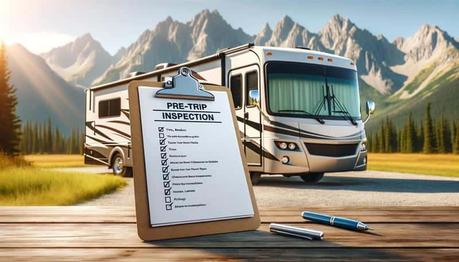
Before hitting the open road, it’s crucial to ensure your RV and its passengers are prepared for the journey. Taking a few steps ahead of time can save you from headaches and dangers later on.
Vehicle Maintenance
One of the most critical aspects of RV safety starts with vehicle maintenance. Ensuring your RV is in top condition can prevent breakdowns and accidents on the road.
Tire Pressure and Condition: Always check your tire pressure before embarking on a trip. Under-inflated tires can lead to blowouts, which are not only frightening but can also cause severe accidents. Additionally, inspect your tires for wear and tear; replace any that show signs of damage.
Brake Inspection: Functional brakes are a non-negotiable part of RV safety. Have them checked regularly, especially before a long trip. I once found myself with barely-there brakes while descending a steep mountain road—believe me, that’s a situation you want to avoid!
Fluid Levels: It is essential to monitor all your vehicle’s fluids, from engine oil to transmission fluid. Low levels can lead to engine trouble or, worse, total failure.
Hitching and Loads: If you’re towing, ensure the hitch is secured correctly and your load is evenly distributed. An unbalanced RV can sway dangerously, making it hard to control, especially in windy conditions. A good measure is to have 60% of your trailer weight forward of the trailer’s axles.
Emergency Supplies and First Aid Kit
Preparation extends beyond the mechanics of your RV. Having the right supplies can mean the difference between a minor inconvenience and a major crisis.
Emergency Kit: Include flares, a flashlight with extra batteries, a spare tire, a jack, jumper cables, and essential tools. These items are lifesavers in a roadside emergency.
First Aid Kit: Your kit should have bandages, antiseptics, pain relievers, tweezers, and personal medications. I always carry a more comprehensive first aid kit tailored to my family’s needs. Too much is better than not enough when you’re miles from the nearest help.
Arrival at the Campground
Once you arrive at your campground, jumping right into relaxation mode can be tempting. However, a few careful steps can help ensure a safe stay.
Site Selection and Inspection
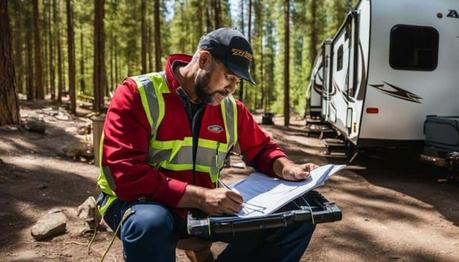
Choosing the right spot and conducting a quick inspection can prevent numerous campground accidents.
Flat, Stable Ground: Always park on flat, stable ground. This prevents your RV from rolling or tipping. If the ground is uneven, use leveling blocks to stabilize your RV.
Overhead and Ground Hazards: Look for low-hanging branches or power lines that could damage your RV. Check the ground for sharp objects like glass or rocks that could puncture your tires or injure someone walking barefoot.
Flood Zones and Soft Ground: Avoid parking in low areas prone to flooding or on soft ground that might not support the weight of your RV. I remember a rainy night when a fellow camper’s RV sank into the mud, making for an extended, exhausting rescue mission.
Setting Up Your RV Safely
Setting up your RV correctly can prevent campground accidents inside and outside your vehicle.
Leveling and Stabilization: Use leveling blocks or stabilizers to keep your RV steady. A rocking RV isn’t just annoying—it can also be dangerous, particularly for small children or older adults who might lose their balance.
Wheel Chocks: Always use wheel chocks to prevent your RV from moving. This small step can prevent a big disaster, especially on sloped campsites.
Securing Awnings and Slide-outs: Make sure awnings and slide-outs are adequately secured. Sudden winds can wreak havoc, and you don’t want to be the one chasing after an awning in the middle of a storm.
Electrical Safety
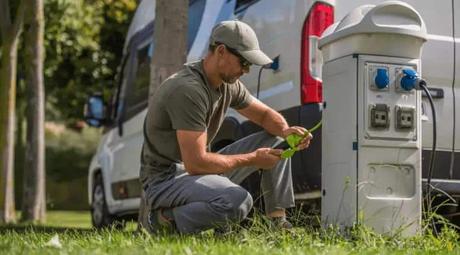
Electrical mishaps are a common cause of campground accidents. Understanding and managing your RV’s electrical systems is vital to preventing fires and other hazards.
Understanding Electrical Connections
Hooking up to a campground’s power supply requires caution.
Correct Hookups: Always double-check that you connect your RV to the proper voltage and amperage. Plugging into the wrong outlet can damage your RV’s electrical system and cause fires.
surge protectors: When connecting to a campground’s electrical supply, use a surge protector. This device can protect your RV from power spikes that can fry your electronics and lead to dangerous situations.
Managing Appliances and Power Usage
Inside the RV, managing your power use is crucial to safety.
Avoid Overloading Circuits: Only use appliances your RV’s electrical system can handle. Overloading the system can cause it to overheat and possibly catch fire.
Proper Appliance Use: Follow manufacturer guidelines for all appliances. This includes never leaving appliances running unattended, particularly those that generate heat, like space heaters or toasters.
Personal Experience with Electrical Safety
I’ve had my fair share of electrical issues on the road, from tripping breakers to dealing with power surges. One memorable night, after a sudden power surge at a campground, I learned the hard way about the importance of surge protectors. I lost a few small appliances but was thankful it wasn’t worse.
Fire Safety
Fire safety is paramount in any RV trip. Even a small fire can quickly become dangerous in a confined space filled with flammable materials.
Fire Prevention Inside the RV
Preventing fires starts with being vigilant about common causes.
Smoke Detectors and Fire Extinguishers: Make sure your smoke detectors work and have a fire extinguisher that is easily accessible. Check them regularly—when you’re out in nature, you’re often far from emergency services, and every second counts in a fire.
Safe Cooking Practices: When cooking, never leave stoves or ovens unattended. Keep flammable items like paper towels or oven mitts away from the stove. I once saw an RV nearly go up in flames because of a forgotten pan on the stove—thankfully, a nearby camper spotted the smoke and acted fast.
Campfire Safety
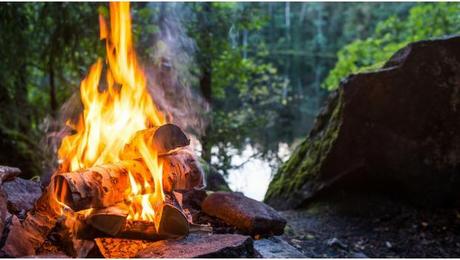
Campfires are a beloved part of camping, but they come with their own set of rules.
Building a Safe Fire: Always build campfires in designated areas, away from your RV and flammable materials. Keep a bucket of water or sand nearby to extinguish the fire if needed.
Extinguishing Campfires Properly: Before leaving your site or going to bed, ensure your campfire is completely out. Pour water over the fire, stir the ashes, and pour more water until it’s cold to the touch.
Personal Insights on Fire Safety
In my travels, I’ve seen both the magic and the danger of campfires. One windy night, a fellow camper’s poorly extinguished fire reignited, spreading flames dangerously close to nearby RVs. A group effort managed to put it out, but it was a stark reminder of how quickly things can escalate.
Propane Safety
Propane is a common fuel source for RVs, powering everything from stoves to refrigerators. However, it must be handled with care to avoid leaks and explosions.
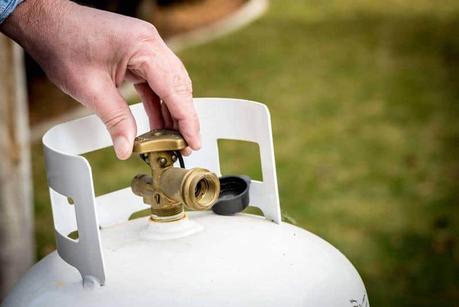
Inspecting and Maintaining Propane Systems
Regular maintenance is vital for propane safety.
Leak Checks: Regularly check your propane system for leaks, including connections, hoses, and tanks. A simple soap and water solution can help detect leaks; bubbles indicate a problem.
Ventilation: Always ensure your RV is well-ventilated when using propane appliances. Carbon monoxide poisoning is a silent killer, and propane appliances can produce this deadly gas if not adequately ventilated.
Gas Detectors: Your RV should have gas detectors for propane and carbon monoxide installed to alert you to a leak. Some can even shut off the gas automatically when a problem is detected. Be aware, though, that these detectors have a finite life span. I change mine every five years, as per the manufacturer’s recommendations.
Proper Usage of Propane Appliances
Using propane appliances safely can prevent campground accidents.
Follow Instructions: Always follow manufacturer guidelines for propane appliances. Never use them for anything other than their intended purpose.
Safe Storage: Store propane tanks upright and in a well-ventilated area. Never keep tanks inside your RV, where leaks could cause a dangerous gas buildup.
Your Recommendations for Propane Safety
From my years on the road, I’ve learned the importance of proper propane maintenance in preventing severe campground accidents. I always travel with a reliable propane detector and encourage fellow RVers to do the same. A small investment in safety equipment can provide peace of mind and potentially save lives.
Water Safety and Sanitation
Water is essential, but it can also pose safety and sanitation risks if not handled properly.
Safe Water Hookups and Usage
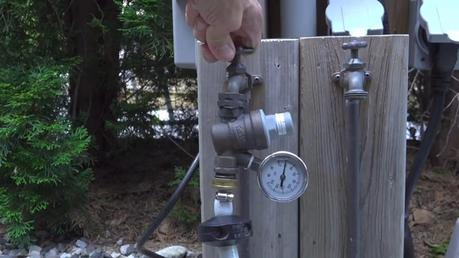
Hooking up to a campground’s water supply requires attention to detail.
Check Water Pressure: Always use a water pressure regulator when connecting to a campground’s water supply. Too much pressure can damage your RV’s plumbing system, leading to leaks or bursts.
Use Water Filters: Install a water filter on your hose to ensure clean, safe drinking water. Even if the campground claims its water is safe, it’s better to be cautious—contaminated water can lead to serious health issues.
Waste Management and Dump Station Etiquette
Proper waste management is not just about convenience—it’s also about safety and respect for the environment.
Handling Gray and Black Water: Always dispose of wastewater at designated dump stations. Never dump waste on the ground—it’s illegal, unsanitary, and environmentally harmful.
Avoiding Contamination: Wear gloves and wash your hands thoroughly after using a dump station. This helps prevent the spread of harmful bacteria and protects you from potential illnesses.
Experience-Based Tips on Water Safety
Over the years, I’ve seen many campers make mistakes with water hookups and waste disposal. One memorable mishap involved a camper who didn’t use a pressure regulator and ended up with a flooded RV. Simple precautions can prevent these headaches and keep everyone safe.
Wildlife and Pest Safety
Being in nature means sharing space with wildlife and pests. Understanding how to coexist safely is crucial for a pleasant camping experience.
Dealing with Wildlife Encounters
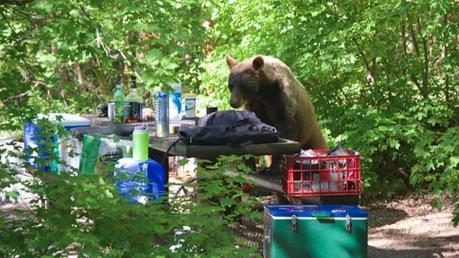
Wildlife encounters can be thrilling, but they also require caution.
Store Food Securely: Always store food in airtight containers and keep it inside your RV or a secure, animal-proof container. Never leave food out overnight, as it attracts animals like bears, raccoons, and squirrels.
Keep a Clean Campsite: Clean up any food scraps or spills immediately. Animals have a keen sense of smell; even small crumbs can attract them to your campsite.
Pest Prevention
Pests can be more than just annoying—they can also pose health risks.
Mosquitoes and Ticks: Use insect repellent and wear long sleeves and pants to protect against bites. Check yourself and your pets for ticks after spending time in wooded or grassy areas.
Rodent Prevention: Keep your RV clean and crumbs-free to avoid attracting rodents. Mice can squeeze through tiny openings, so check for gaps and seal them up to keep these pests out.
Personal Stories on Wildlife and Pest Management
I’ve had my share of wildlife encounters, from curious deer to a too-close-for-comfort bear sighting. I’ve learned the importance of respecting wildlife and keeping a safe distance. It’s their home, after all, and we’re just visitors.
Slip, Trip, and Fall Prevention
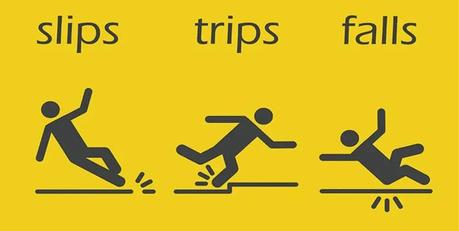
Falls are among the most common campground accidents, but they’re also among the most preventable.
Inside the RV
Preventing falls inside your RV requires attention to detail.
Secure Loose Items: Ensure all RV items are securely stored. Loose objects can become tripping hazards, especially when the RV is in motion.
Use Non-Slip Rugs and Mats: Place non-slip rugs in areas prone to spills, like the kitchen and bathroom. This helps prevent slips, especially when the floor is wet.
Proper Lighting: Ensure your RV is well-lit, especially at night. Install motion-sensor lights in hallways and by the entryway to help prevent trips in the dark.
Outside the RV
Falls outside the RV can be just as dangerous, if not more so.
Stabilizing Blocks and Ramps: Use stabilizing blocks to create a level entryway. If your RV has steps, consider using a ramp for easier access.
Clear the Area: Remove any obstacles around your RV, such as rocks, sticks, or other debris. Keeping the area clear reduces the risk of trips and falls.
Practical Tips from Your Travels
Over the years, I’ve seen plenty of campers take spills, often because they didn’t secure their RV steps or left clutter around their site. Simple precautions can make all the difference in preventing injuries.
Driving and Navigation Safety
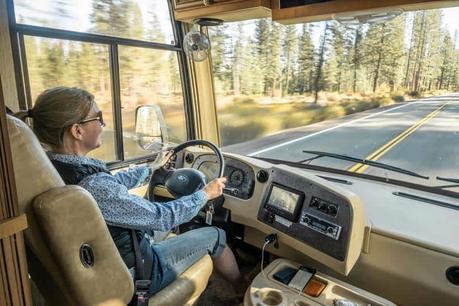
Safe driving and navigation are essential for arriving at your destination without incident.
Navigating Campgrounds and Parking Lots
Maneuvering an RV through a campground requires skill and caution to prevent campground accidents.
Drive Slowly: Always drive slowly through campgrounds and parking lots. Children, pets, and other campers can appear unexpectedly, and it’s crucial to be able to stop quickly.
Use Spotters: When parking or reversing, have someone guide you. This extra set of eyes can help you avoid obstacles and ensure you’re parked safely.
Road Safety and Awareness
Safety doesn’t stop at the campground—getting there is half the battle.
Monitor Weather Conditions: Always check the weather before setting out. Rain, snow, and wind can make driving an RV more challenging, and it’s better to delay a trip than risk an accident.
Navigate Carefully: Be aware of narrow roads, low bridges, and tight corners. Use a GPS designed explicitly for RVs to avoid getting stuck or encountering hazards.
Your Driving Tips
In my years on the road, I’ve learned the importance of patience and caution. A slow, steady pace may not be the most exciting way to drive, but it’s the safest—and when you’re driving a home on wheels, safety is everything.
FAQs
What are the most common accidents around tents?
The most common campground accidents around tents are tripping over tent ropes or stakes, getting hit by a collapsing tent, and burns from campfires or stoves.
Is campground water safe to drink?
The safety of campground water depends on the source. Municipal water sources are generally safe, but water from lakes, streams or wells may need to be treated before drinking to remove contaminants.
What are the most common accidents around RV camping?
The most common campground accidents around RV camping are falls, burns, and carbon monoxide poisoning.
What are the top causes of RV road accidents?
The top causes of RV road accidents are speeding, distracted driving, improper lane changes, and poor vehicle maintenance. Other significant causes are poor hitch and towing connections and overloading the RV beyond its capacity.
Final Thoughts: Preventing Campground Accidents
RVing is a beautiful way to see the world, offering freedom and adventure. However, it’s not without its risks. Campground accidents are common but avoidable. By preparing and paying attention to safety, we can prevent common campground injuries and ensure our trips to the Great Outdoors are filled with joy, not danger. Whether you’re a seasoned traveler or a newcomer to the RV lifestyle, I encourage you to review and update your safety practices regularly. The open road is a great place to be, but it’s even better when you know you’re prepared for whatever comes your way.
Rv Accidents: What We Can Learn From Them
